
Event
Wageningen Impact Expo
On Wednesday 28 August 2024 the Wageningen Impact Expo takes place, organised by Wageningen University & Research (WUR) and supported by University Fund Wageningen. This event showcases and celebrates more than 20 years of entrepreneurship and societal impact by WUR and its partners.
Programme outline
| 13.00 | Welcome |
| 13.10 | Key note by Thijs Verheul, founder of United Wardrobe, eventually sold to Vinted |
| 13.30 | Feedforward mini breakouts & entrepreneurial story sessions |
| 14.30 | Announcement Precubation initiative by WUR, supported by University Fund Wageniningen |
| 15.00 | Feedforward mini breakouts & entrepreneurial story sessions |
| 16.00 | Award ceremony |
| 16.30 | Mix&mingle, drinks and bites |
| 18.00 | Closing |
During this event, you will:
- Discover the innovative solutions developed by our entrepreneurs and experience their impact firsthand.
- Learn about the support and tools that WUR, University Fund Wageningen, and our partners provide to foster entrepreneurship and innovation.
- Find out how you can be part of our collective mission to drive entrepreneurship and create solutions that work.
We look forward to welcoming you to this inspiring event. We aim to shape the future of entrepreneurship and innovation together, within and beyond WUR.
Showcases
1. Wasteboek

With a team of students, Wastebook wants to support food companies to manage their waste, digitally, with a smart e-waste collection box to monitor and manage waste. Their mission is to revolutionise the waste management industry by prioritising resource maximisation, purifying waste streams and ensure the best distribution towards current treatment technologies.
Through collection companies, waste data is shared, enabling users to manage their waste efficiently. Waste should not end up in a landfill but should be re-used as much as possible.
2. Afropulse

Rethinking Africa's role aims to provoke a paradigm shift in how Africa is perceived and engaged with, bridging cultures and continents by empowering local entrepreneurs. Elisabeth Obeings’ Afropulse, seeks to challenge the status quo and empower African partners to lead the way in research, development, and business creation, achieving more balanced and sustainable food systems.
As mediators between continents and cultures, they connect Africa and Europe while partnering with businesses to drive meaningful change. The follow-up on the business idea has already commenced.
3. Green Dilligence

Promoting sustainable development in local communities.
GGreen Diligence is a sustainability consultancy dedicated to promoting sustainable development in local communities. They assist SMEs who want to measure, report, and improve their environmental, social and governance (ESG) performance. Their expertise lies in simplifying the complexities of EU sustainability regulations and reporting standards, opening doors to green finance.

The longer-term vision of Green Diligence is to develop an AI-driven platform that automates sustainability measurement and reporting, making it even easier for SMEs to embrace sustainable practices and fuel improvements through ESG-based grants and subsidies.
The founder Lyubomir Spasov brings a decade of academic and professional experience in environmental issues. His passion for supporting SMEs led him to pitch the idea for the company back in 2018 at the student entrepreneurial challenge StartUp Sussex. Today, Green Diligence is turning that vision into reality, one SME at a time.
4. Afterlife

Afterlife is a startup aiming to revolutionise global food systems by converting food byproducts into valuable resources through innovative fungal fermentation technology. Addressing current food system inefficiencies and the growing demand for eco-friendly protein sources, Afterlife transforms large volumes of food industry leftovers into versatile, neutral and functional protein ingredients suitable for meat replacers and other applications. Their ground-breaking work earned them the Rethink Waste Challenge 2023 and the Dutch 4TU Impact Challenge 2023.
5. SoualiGas
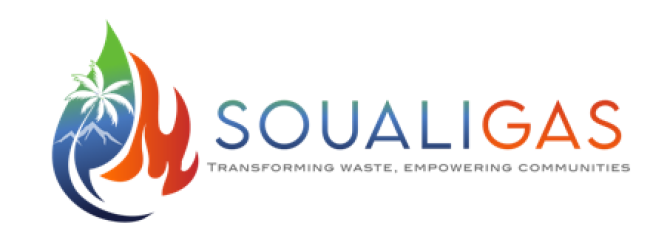
SoualiGas was inspired by the founder's home island of St. Maarten, which has a huge waste management problem.Its landfill is an uncontrolled, dangerous eyesore that frequently catches fire, polluting the air and damaging the environment.The health of the island’s citizens, biodiversity and economy is currently at great risk because of the large amount of waste pollution brought in via tourism activities and the island's reliance on importing its needs.SoualiGas aims to solve this by empowering not only St. Maarten, but all Small Island Developing States (SIDS) by transforming waste into resources through Advanced Thermochemical Conversion, a process that transforms solid materials into a wide array of valuable products.

This technology offers numerous benefits, including high efficiency energy production, transformation of waste into chemical feedstocks, reduced environmental impact, carbon capture and resource recovery. It also provides near-complete waste volume reduction, reduced dependence on fossil fuels and is a versatilesystem with high adaptability, scalability and a small footprint. By converting waste streams into valuable resources, SoualiGas aims to help SIDS become more resilient to climate change, more future-proof amid global instability and more autonomous, thus empowering local communities and restoring their natural beauty.
6. Hippotainer

Container vertical farm with hydroponics system.
Hippotainer is a vertical farm in a 40ft freight container with a Deep Water Culture (DWC) hydroponics system. This makes it possible to grow a variety of plants with the Hippotainer, like lettuce, herbs, seedlings etc. A new design in the making will make growing more vegetables like kale and fruiting vegetables possible. The Hippotainer carefully controls the environmental conditions for optimal plant growth, allowing cultivation at any time, in any location and in any weather.
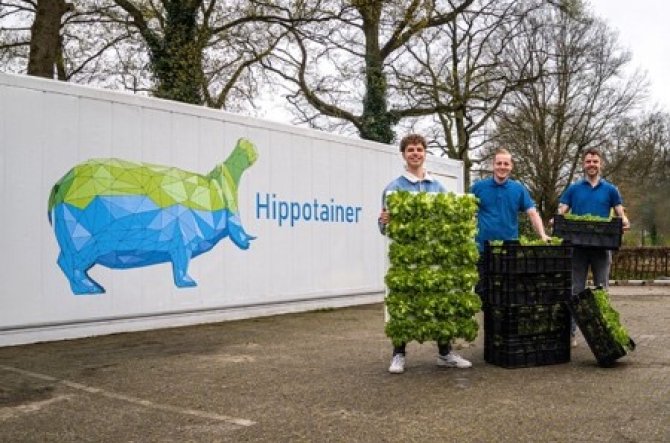
A pilot project is running in Ukraine growing vegetables and providing jobs for local refugees in partnership with Rijk Zwaan, Signify, Grow Foam and many more.
7. ValueSort.AI
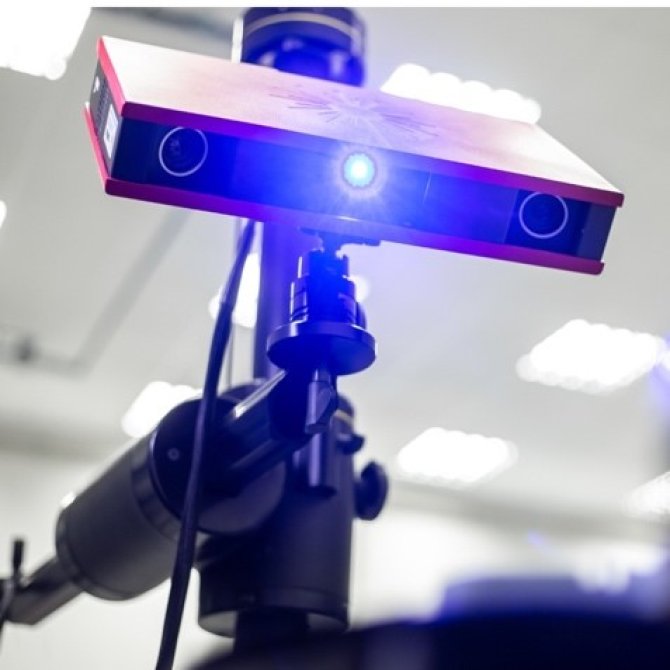
ValueSort.AI enables decision makers to develop highly-scalable vision AI for the entire value chain, transforming the traditional processes with more customisation, automation and increased efficiency.
“ValueSort.AI enables sorters to identify high-value items with AI visual recognitions, removing the challenge of sourcing on-demand quality second-hand textiles, sorters can surpass traditional methods that focus on weight, allowing textile sorters to capitalise on the second-hand textile market’s growth. ValueSort’s technology can assist humans, reducing costs in training humans and increasing revenue”, according to Bart van Gorcum, founder of valueSort.AI.
8. Maxairea

Maxairea is working on a pilot project at WUR to integrate its CO2 filtration technology into an existing HVAC system.
Co-founder Rabih Hamid is very excited about the pilot project; “Maxairea is my third company and my background in engineering and ten years in construction has significantly shaped my entrepreneurial journey.” Together with Co-founder William Janssen, who has a longtime experience in the ventilation industry and with that build up an extensive network in this industry, Rabih and William are currently working on the commercial validation of Maxairea. For Rabih the work has focussed on the physics of building management and energy efficiency of HVAC systems.
9. Convivial conservation center
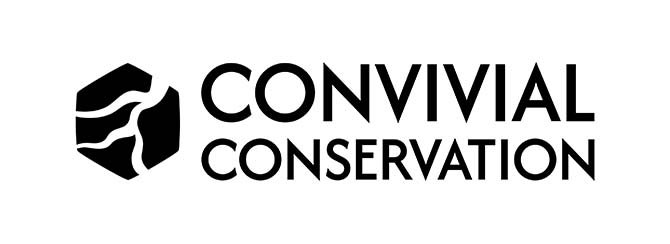
Convivial (literally: ‘living with’) conservation offers a new and integrated approach to understanding and practicing environmental conservation. It is a Whole Earth vision that responds to the major ecological, social and political-economic challenges facing people and biodiversity in the 21st century. Several research projects are ongoing to learn from innovative practices and to support them by providing a vision that unites different struggles in pursuit of a socially and ecologically just conservation.
The idea is to build on promising examples to develop a general conservation model embodying more convivial principles both within these sites and elsewhere.
10. Insectsense

InsectSense leverages insect biomimicry to develop innovative solutions. By mimicking insect senses, which have evolved over 300 million years, they created devices and biochips that works like insect antenna for flavour measurement, disease diagnosis, water quality monitoring and the development of novel nutraceutical and pharmaceutical ingredients. Initially, they trained bees as biosensors to detect COVID-19, then advanced to a biochip that replicates insect sensing. This biochip works with different DNA from humans and insects, enabling the objective measurement of taste and smell, as well as identifying the health effects of ingredients. For instance, it can identify the cause of off-taste in novel food products, help improve flavour and evaluate potential health effects, all on a single chip.

Their first product, ReceptomiX, is a benchtop device for lab-use expected to launch in late 2025. Their second product, LumiNose, applies this biochip technology for field use, such as inline measurements in factories. By use of these technologies, companies can bring sustainable, tasty and healthy products to market more quickly, reducing both time and costs while making a significant impact.
11. Zwamcijsje

The savoury roll filled with circular, locally grown mushrooms, het Zwamcijsje, is captivating the Netherlands with its crispy, golden-brown exterior and deliciously tender, juicy interior.
Both supporters and skeptics are amazed by how tasty this completely plant-based successor to the traditional sausage roll is. The sausage roll is beloved and deeply ingrained in Dutch food culture. However, as the most environmentally taxing bakery products, it increasingly poses a challenge for food service companies that are modernising en masse.
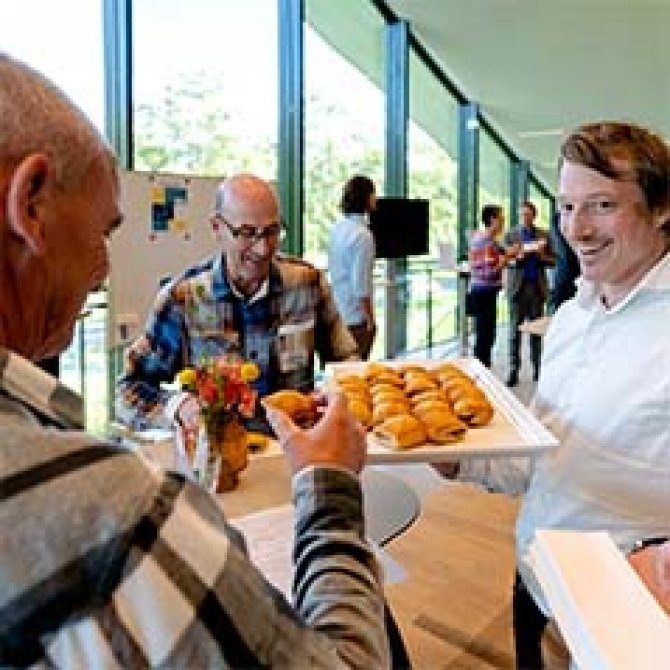
Het Zwamcijsje offers a solution for a rapidly growing number of businesses due to its fantastic taste and innovative production process, which is logical and sustainable in every aspect. The filling is made from oyster mushroom stems, providing the characteristic bite, even though this part is often wasted due to the complexity of processing it. By using oyster mushrooms as the base for the filling, Het Zwamcijsjeis entirely plant-based, with significantly less fat, a lower carbon footprint, reduced water usage, and less arable land required.
12. Greencovery
Greencovery upcycles ingredients that are tasty and good for people and the planet. They are on a mission to reduce food waste and make upcycled ingredients the norm in the food industry. At Greencovery, food will be upcycled that otherwise would be wasted, extracting high-quality, safe and environmentally friendly ingredients that retain their natural functionality. In this way Greencovery enables leading food companies to produce sustainable ingredients from production side-streams, enhancing productivity, reducing waste and lowering carbon emissions. Greencovery accelerates the time-to-market for new, sustainable ingredients, aligning with SDG-2, SDG-9, and SDG-12.

13. Algreen
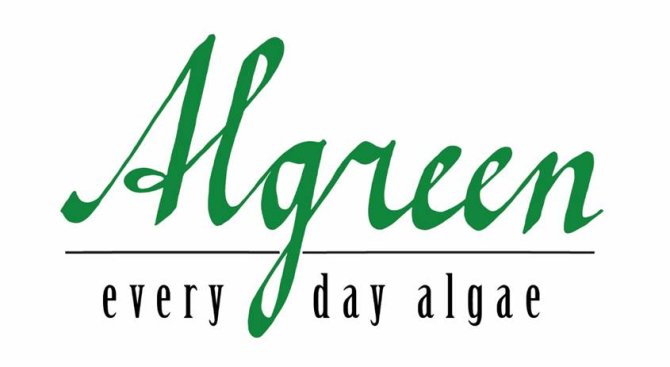
Algreen offers service starting from proprietary collection of microalgae to the production plant; Algeen is able to work with different culture techniques, such as open ponds and tubular photobioreactor Supporting the customer by designing a new process from scratch R&D lab scale processes or working on the optimisation of an established process.
Algreen is working to optimise and scale up galdieria’s biomass production. Galdieria, like spirulina, can be used as superfood. However, it is cheaper, easier to grow and even more nutritious a it can convert organic waste into valuable proteins. Galderia has great potential to help improve human health, encourage a transition to a more plant-based diet, reduce energy use, making good use of organic waste.
14. No Fairytales

No Fairytales are innovative, health-conscious tortillas made from vegetables, designed to provide a nutritious and delicious alternative to traditional wraps. By incorporating a significant percentage of vegetables like carrots and beets, these wraps offer enhanced nutritional value, including higher fiber content and essential vitamins, while maintaining a low-calorie profile.

No Fairytales makes it easy to increase daily vegetable intake without compromising on taste or convenience, supporting a balanced diet and a sustainable lifestyle.
15. SOLYNTA

Solynta's mission is to enhance global food security by providing innovative hybrid potato solutions that improve the livelihoods of producers worldwide. We believe in ensuring nutrition for all. Our pioneering breeding method, based on true potato seed, addresses the growing demand for robust, new potato varieties among farmers. This breakthrough guarantees year-round access to clean, high-quality potato starting material, empowering farmers globally to cultivate delicious and nutritious potatoes successfully.

Solynta is the first to breed hybrid potatoes from true seeds, offering sustainable solutions to global challenges. Through worldwide collaboration and our cutting-edge technology, we aim to make a significant, lasting impact on the global food supply and envision a future where hybrid potatoes are widely adopted.
16. Super-Mendelian micro factories

Super-Mendelian micro factories represent a cutting-edge intersection of genetics, synthetic biology, and biotechnology, offering revolutionary potential for various industries. Their ability to propagate desired traits rapidly and efficiently could transform production systems, though careful consideration of ethical, ecological, and regulatory aspects is essential for their responsible deployment. There are regulatory challenges in approving and overseeing the use of gene drives and other advanced genetic engineering techniques and acceptance of these technologies by the public and stakeholders is crucial.